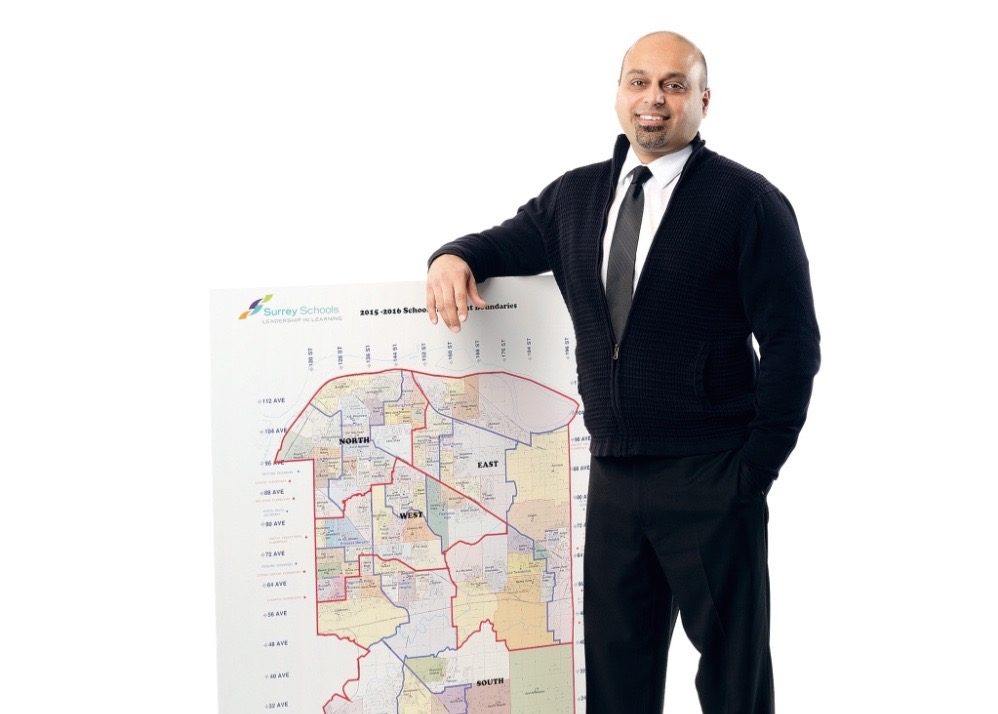Great Canadians: Surrey Wraparound Program
Rob Rai works to keep kids in the classroom and out of gangs.
 Among the photos dotting the walls of Rob Rai’s office in Surrey, B.C., is one of a beaming, burly young man in a cap and gown. The new grad towers over Rai, who is flashing his own grin. A decade earlier, in 2005, this vignette was a distant hope: the young man was on the brink of wasting his potential – and possibly his life.
Among the photos dotting the walls of Rob Rai’s office in Surrey, B.C., is one of a beaming, burly young man in a cap and gown. The new grad towers over Rai, who is flashing his own grin. A decade earlier, in 2005, this vignette was a distant hope: the young man was on the brink of wasting his potential – and possibly his life.
Rai, who at 42 has spent over 10 years working with Surrey’s youth, knows better than most that at-risk teens are frequently drawn to the flashy lifestyle associated with the city’s gangs. Kids barely out of grade school can deliver drugs and pocket more than $200 a day. But that fast cash sucks them into a turf war that has turned Surrey – which has the highest rate of youth poverty in Metro Vancouver – into a grim backdrop for drive-by shootings.
After earning a diploma in investment management at the University of British Columbia in 1996, Rai landed a desk job with a not-for-profit that educated children on environmental issues. It wasn’t the right fit. “I would be doing boring paperwork and see my co-workers hanging out with the kids,” says Rai. He successfully lobbied his director for a hands-on role and later worked with homeless teenagers in Vancouver’s Downtown Eastside. In 2005, newly hired by the Surrey School District’s Safe Schools Department, Rai was assigned his first case file: it belonged to a Grade 7 student who had been expelled for bullying and theft of school property. The young man in the picture.
Rai made a home visit and chatted with the boy’s mother in Punjabi, disarming the family with his calm manner. For a year, the outreach officer and his charge met twice a week. Rai, who believes “you are what you put your time into,” took the boy to drop-in basketball and floor hockey sessions, nurturing a passion for athletics that would lead to amateur wrestling titles and, eventually, university.
Within four years of that first case, Rai launched the Surrey Wraparound Program, funded by Public Safety Canada and drawing 17 staff members from the Surrey School District, the City of Surrey and the RCMP. At any one time, Wrap provides individual support to nearly 100 youth, ages 11 to 17. “You end up wanting to take them home,” says Rai. “And the kids don’t want to let the adults down.”
Much of Wrap’s success hinges on addressing issues simultaneously. Staffers might take kids to counseling appointments, but they’ll also help participants’ parents secure employment-like the time Rai raised money so one mother could become a Zumba instructor.
Family participation is a key factor in discouraging-or encouraging-gang involvement. (Rai estimates that of the 400 Wrap kids past and present, at least 50 have fathers or siblings who were shot in gang-related confrontations.) Raised by a single mom, Tuan revered his gang member brother and was dealing drugs by Grade 7. But then Wrap member and RCMP constable John Wilson entered his life, driving him to classes and finding him a tutor. Seven years on, Tuan has finished high school and dreams of starting a plumbing business.
Tuan is just one of Wrap’s triumphs. After graduating from the program, participants are 67 per cent less likely to have a run-in with police. Wrap has been used as a model for school systems in Nova Scotia, the Prairies and cities such as Chicago and Los Angeles.
And the bonds formed last long after the files are closed. Take, for instance, the young man in the photo. Now 23, Jessy Sahota emulated his mentor after completing a degree in criminology. “This is grassroots prevention,” says Sahota, who keeps tabs on a dozen youth every day as a Wrap school liaison.
For Rai, the next best thing to taking a kid home is bringing him to work.



